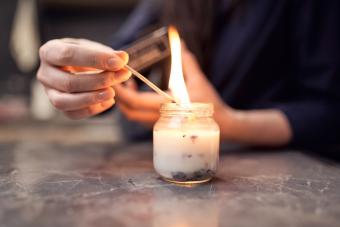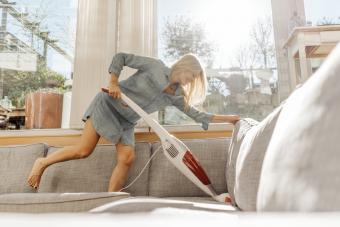
Wood floors can make home interiors more beautiful, but it can take a lot of work to clean and maintain them. Many homeowners opt for homemade cleaning solutions for various reasons including cost and a preference to control what ingredients are used.
Homemade Wood Floor Cleaner Ingredients
Wood floors are fabulous. However, you can't just throw any old cleaner in a bucket of water and go because you might wind up having to remove water stains from the wood later on. You need to be meticulous about your cleaning solutions for dirt, scuff marks, or grease. But that doesn't mean you need to spend tons of money on commercial cleaners. Instead, you can make them right at home with a few easy to find ingredients.
- White vinegar
- Essential oil
- Black tea
- Linseed oil
- Liquid dish soap (Dawn recommended)
- Olive oil
- Mop (sponge and microfiber)
- Bucket
- Lemon juice
And remember, you'll want to give your floors a good vacuuming or sweeping for dirt, dog hair, and remove debris like wax before you start any mopping process.
DIY Wooden Floor Cleaners With Vinegar
When it comes to DIY cleaning, white vinegar goes with everything. Literally, this is one of your most versatile cleaners. And it works for floors too! For this recipe:
- Combine ½ cup of white vinegar and 1 gallon of water in a small bucket.
- Add a few drops of lemon or orange essential oil to the solution if you want a scented cleaner.
- To clean your wood floors, simply dip a sponge mop in the solution and squeeze it dry.
- Wipe it across your floors while rinsing the mop out frequently.
- Take a clean and dry cloth to wipe out any damp areas on the floor.
DIY Hardwood Floor Cleaner With Black Tea
Black tea isn't just for drinking. It works great to clean and polish floors. Who knew, right? For this method, use these steps.
- Pour 4 cups of water into a pot.
- Bring the water to a boil, then remove it from the heat.
- Add the 3 tea bags and allow to steep for 10 minutes.
- Remove the tea bags and submerge a soft cotton cloth or hardwood floor mop cleaning pad into the solution.
- Attach the cloth or pad to the mop and wipe the floor down. The tannic acid in black tea removes dirt and leaves a beautiful shine on wood floors.
Homemade Hardwood Floor Spot Cleaner
Looking for a good spot cleaner for your hardwood floors? Grab the linseed oil and white vinegar.
- Combine equal parts of vinegar and linseed oil.
- Wipe the floor using the mixture and buff the floor using a rag.
DIY Hardwood Floor Cleaner for Greasy Floors
When it comes to greasy hardwood floors, Dawn is a no-brainer. The grease-fighting power of dish soap can cut any greasy mess in minutes. For this method, grab the white vinegar and Dawn.
- Fill a spray bottle with warm water.
- Add a few drops of liquid dish soap and a cap full of white vinegar.
- Mist the areas that need cleaning, then quickly mop or wipe the floor with a microfiber.
- Make sure all moisture has been wiped away.
Homemade Hardwood Floor Cleaner That Shines
Two in one homemade floor cleaners not only cut grim but leave your hardwood floors with a rich shine. To save yourself a polishing step, grab the lemon juice and olive oil. This is also a great recipe for those adverse to the vinegar smell.
- Fill a bucket with a gallon of warm water.
- Add in ¾ cup of olive oil and ½ cup of lemon juice.
- Dip in your mop and wring it out well.
- Mop and go. No need to dry.
Homemade Hardwood Floor Polish

Another great method to cut dirt and shine up your floors is by mixing vinegar and olive oil. For this method, follow these steps.
- Combine ½ cup of vinegar and 1 cup of olive oil in a plastic bowl or container.
- Dip a soft cloth in the mixture and wipe over the floor.
- Buff off with a dry cloth.
Making Hardwood Floor Cleaner vs. Buying Cleaner
If you're on the fence about whether to buy hardwood floor cleaner or make your own, weigh the pros and cons of each kind.
Homemade Cleaner
Homemade hardwood floor cleaners do have pros and cons. Looking at both can help you decide if this is a method for you. The pros include:
- Natural ingredients are more environmentally friendly.
- You probably have the ingredients in your kitchen.
- You can save money even if you have to buy the ingredients, which can also be used for other household projects as well as the cleaner itself.
However, the good does come with some cons like:
- You assume all the risks when using a homemade cleaner.
- The cleaner you make may not be as effective as a professional product.
- Ingredients that include water could warp the wood.
Buying Cleaner
Just like a DIY wood floor cleaner method, commercial products are full of pros and cons too. First, the pros:
- Cleaners specifically designed for cleaning hardwood floors may work better than homemade cleaners.
- The manufacturer of the product may have to assume some or all liability if the product damages the floor when used as directed.
- The cleaner could also be non-toxic or eco-friendly.
Now, it's time to explore the cons to help you make the most informed decision.
- The chemicals in the cleaner may be toxic to the environment.
- The cost could be significantly higher than a homemade remedy.
- The product might only be suitable for cleaning hardwood floors and nothing else.
Choosing a Hardwood Floor Cleaner
Choosing the best wood floor cleaner depends on your floors and on the type of mess you are cleaning. Experiment on small sections of the floor until you find the one that makes your floors look their best.







